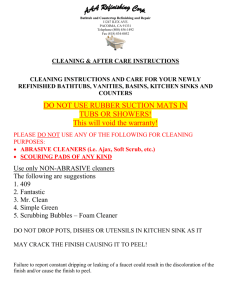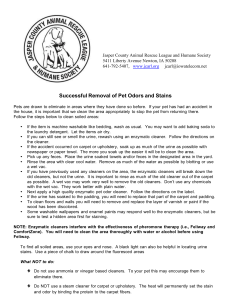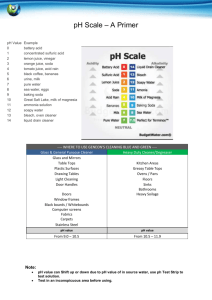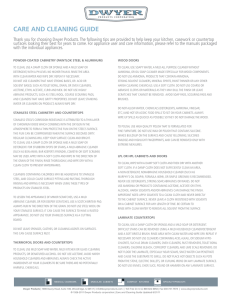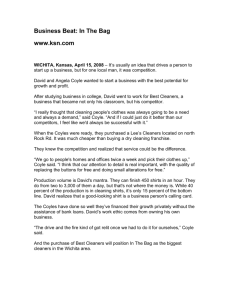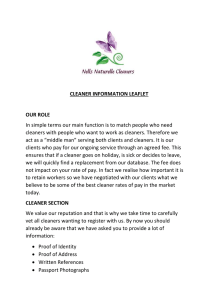THE SUITE LIFE: CLEANING GUIDE
advertisement
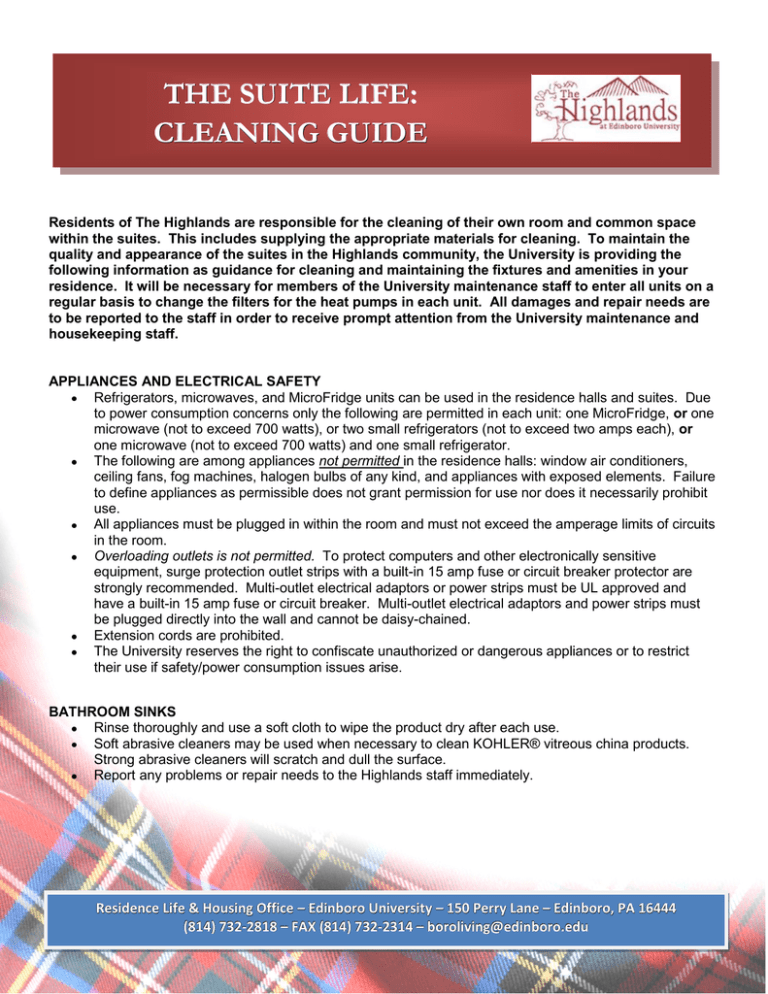
THE SUITE LIFE: CLEANING GUIDE Residents of The Highlands are responsible for the cleaning of their own room and common space within the suites. This includes supplying the appropriate materials for cleaning. To maintain the quality and appearance of the suites in the Highlands community, the University is providing the following information as guidance for cleaning and maintaining the fixtures and amenities in your residence. It will be necessary for members of the University maintenance staff to enter all units on a regular basis to change the filters for the heat pumps in each unit. All damages and repair needs are to be reported to the staff in order to receive prompt attention from the University maintenance and housekeeping staff. APPLIANCES AND ELECTRICAL SAFETY Refrigerators, microwaves, and MicroFridge units can be used in the residence halls and suites. Due to power consumption concerns only the following are permitted in each unit: one MicroFridge, or one microwave (not to exceed 700 watts), or two small refrigerators (not to exceed two amps each), or one microwave (not to exceed 700 watts) and one small refrigerator. The following are among appliances not permitted in the residence halls: window air conditioners, ceiling fans, fog machines, halogen bulbs of any kind, and appliances with exposed elements. Failure to define appliances as permissible does not grant permission for use nor does it necessarily prohibit use. All appliances must be plugged in within the room and must not exceed the amperage limits of circuits in the room. Overloading outlets is not permitted. To protect computers and other electronically sensitive equipment, surge protection outlet strips with a built-in 15 amp fuse or circuit breaker protector are strongly recommended. Multi-outlet electrical adaptors or power strips must be UL approved and have a built-in 15 amp fuse or circuit breaker. Multi-outlet electrical adaptors and power strips must be plugged directly into the wall and cannot be daisy-chained. Extension cords are prohibited. The University reserves the right to confiscate unauthorized or dangerous appliances or to restrict their use if safety/power consumption issues arise. BATHROOM SINKS Rinse thoroughly and use a soft cloth to wipe the product dry after each use. Soft abrasive cleaners may be used when necessary to clean KOHLER® vitreous china products. Strong abrasive cleaners will scratch and dull the surface. Report any problems or repair needs to the Highlands staff immediately. Residence Life & Housing Office – Edinboro University – 150 Perry Lane – Edinboro, PA 16444 (814) 732 732--2818 – FAX (814) 732 732--2314 – boroliving@edinboro.edu CABINETS To remove stubborn dirt, wash around all handles and any other grease zones first with hand dishwashing detergent. Then wash the entire cabinet, including the handle areas, with an oil soap solution. Just wipe lightly with the solution and buff dry immediately with a terry cleaning cloth. Always wipe dry with any grain or pattern. Seldom do you need to add any polish because the surface has its own sheen when clean. If your cabinets are dull from wear or age, spray furniture polish very lightly once a year or so to fill in the pores and bring back some life. CARPET If you enjoy going barefoot, or even if you don't, kick your shoes off at the door. Why remove your shoes? If you have a rough board that needs smoothing, you grab a sheet of sandpaper for the job. Guess what's on the bottom of your shoes? Sand and dirt grind away at the fibers in your carpet, leading to an early death. Take a closer look at the bottoms of those shoes and you'll find oil, dirt and heaven only knows how many bits of leftover dog deposits. Small wonder why your carpet stubbornly refuses to come clean. Do wear slippers or socks inside. The oil from the bottom of your feet also dirties the carpet. Vacuum your carpet regularly, and do not use liquid carpet shampoos to clean them. Ever wash your hair and forget to rinse out all the shampoo? The same thing happens to your carpet. The shampoo can't be completely rinsed out, leaving a sticky residue. That residue acts like a big magnet pulling the dirt from the bottom of your shoes. Now you have clean shoes and even dirtier carpets. Use dry carpet cleaners instead. Stores selling vacuum cleaners carry dry carpet cleaners. Stains in carpet can be a hassle to remove. Never rub a stain, just blot. Rubbing breaks down the fibers and spreads the stain. Remove most food stains with shaving cream. Spray on and resist the temptation to rub it in, and then let it set for 15 minutes. Rinse with a vinegar and water solution. Housekeeping has carpet cleaning machines. Notify Residence Life if you have a heavily soiled area that needs to be cleaned and we will coordinate cleaning of the carpet with Housekeeping. COUNTERTOPS Never use abrasive cleansers or steel wool on laminate countertops. For general cleaning, a two-sided scrubbing pad with fiber on one side and a sponge on the other works particularly well. Moistened slightly with water, the fiber side is just abrasive enough to loosen greasy smears and other soil. Use hand dishwashing detergent and water to wipe off countertops daily. FAUCETS To ensure the long-lasting beauty of your faucets, we recommend that you use a mild soap solution and a soft cloth for cleaning. After cleaning, rinse and blot dry with a soft cloth. The use of abrasive or acid cleaners, polishes or solvents may permanently damage the finish. Report any problems or repair needs to the Highlands staff immediately. FURNITURE Sofas, chairs and loveseats: Use Water-Based Cleaner. Spot clean this fabric with the foam only of a water-based cleaning agent such as a mild detergent or commercial upholstery shampoo. Use sparingly. Avoid over-wetting. Case Goods: Any household cleaner such as Windex can be used on the metal and laminate parts of the product. Furniture polish should not be used on these parts. Furniture polish such as Pledge should be used for the wood surfaces on the chairs and dressers. SHOWER SURROUND AND BATHTUB UNIT Abrasive cleaners may scratch and dull the surface of the unit. To clean the unit after installation, use warm water and one of the stronger liquid detergents, such as; Top Job, Liquid Ajax, or Mr. Clean. Use these liquid detergents for normal day-to-day cleaning. Plaster can be removed with a nylon or polypropylene scrubber. DO NOT USE steel wool, metal scraper, wire brushes, or other metal tools. One of the powder type detergents, such as Spic & Span, may be used on a damp cloth to provide mild abrasive action to remove residue plaster. Minor stains can be removed with a household strength ammonia or bleach. DO NOT MIX AMMONIA AND BLEACH. A periodic scrub down with gel gloss or a dishwashing detergent (wear rubber gloves) will usually remove any soap or mineral deposits. Periodic waxing with an automotive polish followed by a light application of liquid wax, such as Johnson’s’ Jubilee will add luster and preserve the finish. Report any damage, problems or repair needs to the Highlands staff immediately. STAINLESS SINK An ounce of prevention ... Forget the pound of cure. Stainless is easily kept stain-free with these simple steps: Since most soaps and detergents contain chlorides, Just recommends frequent rinsing of your stainless sink, preferably after each use. Combine this simple daily treatment with a weekly cleansing with an abrasive cleaner, ideally Bon-Ami or Zud. Unlike porcelain sinks, durable stainless stands up strongly to abrasive cleansers. Remember always to scrub in the direction of the polish lines so that your efforts blend with the surface of your sink. For a less aggressive approach, try cleaning your sink with a paste of baking soda and water. Rinse well and dry. Regularly drying your sink works wonders to prevent water and surface rust marks. Looking for that extra sparkle? Use flour power to polish your sink by applying dry flour when the look you're after is a gleaming finish. Rub the flour in with a soft cloth, and then rinse and dry. Club soda will do the sparkle trick as well. After placing the stopper in your sink, pour some club soda in and rub with a soft cloth. As always, dry with a soft cloth to prevent water spots and surface rust. Add some shine with a few drops of baby oil. Wipe off with paper toweling and repeat for added shine. Some things are best avoided: A few DONT's for Stainless care... Don't let soap cleansers dry on the sink's surface. Rinse regularly to keep the chlorides found in most cleansers from affecting the natural luster of stainless. Steer clear of steel wool pads. The iron particles that are left behind can lead to rust and corrosion. For hard-to-clean projects, try a ScotchBrite scouring pad when the job at hand requires a little extra effort, again in the direction of the grain. Avoid leaving steel and cast iron cookware in your sink for extended periods of time. Iron plus moisture on top of stainless can lead to surface rust and staining. Rubber dish mats, wet sponges and cleaning pads are a no-no for a lengthy stay in your sink. Since they trap water, discoloration and staining can result. Just as you don't use your cutting board to clean the dishes, don't use your sink as a cutting board. Knives and other sharp kitchen instruments will naturally damage the surface of your sink. TOILET CLOGS Please become familiar with the flush operation of the toile. There are both low and high water flow settings. Use the appropriate setting to clear waste from the bowl. Use a plunger to clear any clogs! Do not attempt to repeatedly flush the toilet, as this will cause flooding. CLEANING Clean the outside surface of your vitreous china toilet with mild soap and warm water. Wipe the entire surface completely dry with a clean, soft cloth. You may use soft abrasive cleaners when necessary to clean your toilet. Do not use strong abrasive cleaners, as they will scratch and dull the surface. Wipe any splashes of cleaner solutions from plastic or plated surfaces immediately. Use toilet bowl cleaners on the inside of the bowl only. If the surface becomes excessively dirty, use a general purpose cleaner such as: Fantastik® All Purpose, Lysol® Basin, Tub and Tile Cleaner, Soft Scrub® Multi Purpose, Scrub Free® Disinfectant Bathroom Cleaner, Clorox Clean-Up®, Spic and Span Liquid, Comet® Liquid Bathroom Cleaner, Scrubbing Bubbles® Bathroom Cleaner, Bar Keeper’s Friend®, or Bon Ami®. Over time, hard water deposits may clog toilet rim holes and trapways. To clean, use a commercial cleaner that is recommended for removing hard water deposits. Follow the cleaner manufacturer’s instructions. WARNING: Risk of property or product damage. Do not use in-tank cleaners in your toilet. Products containing chlorine (calcium hypochlorite) can seriously damage fittings in the tank. This damage can cause leakage and property damage. VINYL PLANK FLOORING CARE Clean up spills immediately. Do not let dirt and grit build up on floors. Lightly wash floor regularly with warm water and vinyl floor cleaner. Do not use soap based detergents or abrasive cleaners. To avoid possible permanent indentation or damage, proper floor protection devices must be used under furniture and appliances. Exercise care when removing and replacing furniture or appliances. WALLS AND DOORS Pictures, posters and other materials may be hung using 3M products with Command Adhesives or poster putty; however, if paint peels when removing these materials, the occupant(s) may be charged for labor and materials to repaint the area. The use of nails, screws, tacks, glue, masking tape, and other adhesive on walls, mirrors, ceilings, wardrobes, woodwork, appliances, fixtures, doors or furniture is prohibited. All decorations, 3M products, and poster putty must be removed when the resident vacates. Residence Life & Housing Office – Edinboro University – 150 Perry Lane – Edinboro, PA 16444 (814) 732 732--2818 – FAX (814) 732 732--2314 – boroliving@edinboro.edu
